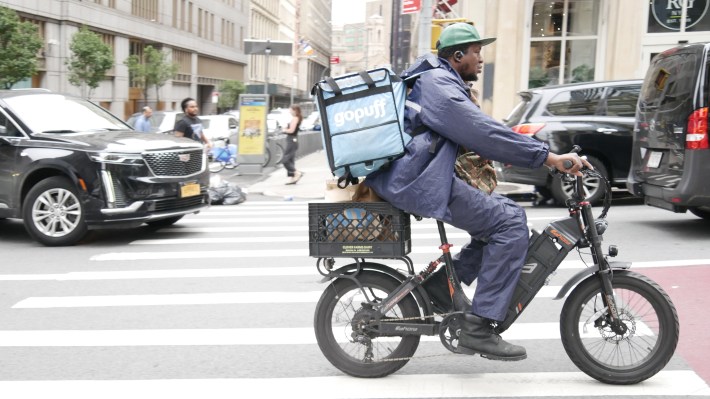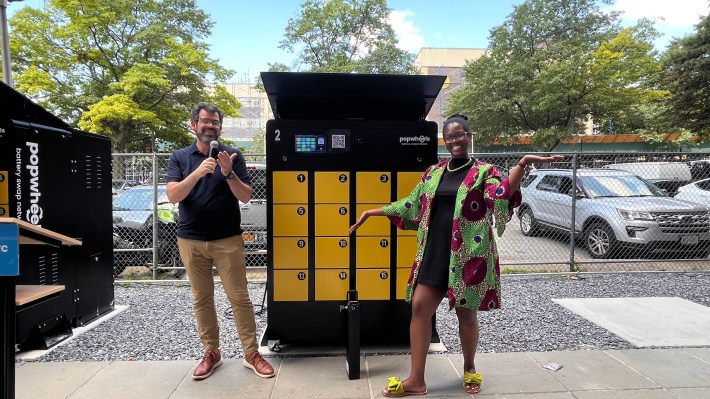New Yorkers will have to wait at least two more years for more public e-bike charging infrastructure as lithium-ion battery fires continue citywide — as DOT cheers its own baby steps in the bureaucratic process.
On Tuesday, the Department of Transportation issued a laudatory press release touting how it will be taking the first steps to “begin the process” of the procurement and siting process to install 25 lithium-ion battery charging stations in the city by 2027. In other words, if current trends in conflagrations continue, there'll be roughly 400 more fires caused by these batteries before the safe infrastructure is installed.
The announcement of the start of the process of the process offered little but the new timeline, which pushes off the completion of any public charging infrastructure until four years after the mayor released a plan, Charge Safe, Ride Safe Action Plan, that laid out how the city would combat the lithium-ion battery crisis.
The Fire Department has been successful in reducing injuries and deaths from the extremely hot and hard-to-extinguish battery fires, but their number has not meaningfully decreased since the pandemic peak. Through Nov. 17 of this year, there were 249 lithium-ion battery fires recorded by FDNY, resulting in 42 injuries and one death. In all of 2024, there were a total of 279 fires, 99 injuries and six fatalities.
The DOT says the 25 sites will be located in neighborhoods with “the highest delivery traffic,” but did not specify how charging ports will be at each site. The city currently has around 80,000 delivery workers, most of whom rely on e-bikes, plus untold thousands of e-bike-using commuters or parents schlepping kids to school.
Given that lithium-ion battery fires have been raging since 2020 — and calls for public charging started shortly thereafter — it's fair to ask why public charging has been so slow to be built.

First, it's not like the DOT hasn't done anything. After report was released in 2023, the department got started on an e-bike battery charging pilot where three companies — Swobbee, Popwheels, and Swiftmile — installed battery swap cabinets at five locations throughout the city. Those locations were up and running in 2024 and the report evaluating the six-month pilot was released in November of that year. Now it's been over a year since the end of the pilot and the department is beginning the process of putting together a full-time program.
When asked about the drawn out timeline, the department told Streetsblog that it's all part of the process. First, it will be issuing a request for proposals to identify a vendor for the swap program thanks to funding through a grant.
“Following the recent completion of our successful public e-bike charging pilot program, we are thrilled to have new grant funding that will allow us to build this network of 25 battery charging cabinet locations. We will now enter the city’s procurement process to identify a vendor for the cabinets and will work with utility companies to identify suitable locations for the cabinets and to complete the underground utility work needed to power the cabinets when they are installed,” said deputy press secretary Will Livingston.
Those who are working to build e-bike charging networks in the private sector see this announcement as a validation of their business model and a step forward for the city, but acknowledge that there is still a lot that needs to be ironed out.
“Twenty five locations, depending on the size, can service 100,000 people or it can service 800. We don't know, but we think that this is just the beginning,” said Baruch Herzfeld, the co-founder of Popwheels, a battery charging company that was part of the city’s pilot program. “Our company's goal is to improve New York, and make it safer for everyone. [The announcement] is a validation of our concept.”
Popwheels has been working on creating a charging network for delivery workers since 2022, after Herzfeld wrote an editorial in Streetsblog calling for the city to step up and help the idea get off the ground. Since then, the city has consistently cited e-bike battery charging infrastructure, be it public or private, as a main component of solving the fire crisis.

The city and state worked quickly to pass point of sale laws regulating batteries and bikes to try and stop residents from getting uncertified batteries and bikes, which are more likely to catch fire and cause the death and injury associated with the crisis, and has an education campaign with FDNY to teach delivery workers and other e-bike users the proper way to charge their equipment.
But the promise to create a robust network of outdoor battery charging infrastructure to support the growth of e-bike use has flopped, and the amount of fires has remained relatively consistent since the peak in 2022.
Part of this has to do with a lack of agency coordination and the constantly in flux regulatory environment for companies wishing to install charging infrastructure, which the company Swobbee told Streetsblog is a New York City specific issue. In Jersey City, the company was part of the nation's first rollout of public, permanent charging infrastructure.
In February, the FDNY began requiring a new test to certify battery swap cabinets, but no companies have been able to run the test because it had not yet been certified by the Occupational Safety and Health Administration. After Streetsblog exposed this the FDNY quickly updated its rules, attempting to remedy the issue but ultimately leaving more questions than answers.
In addition to the promise of these 25 public sites, the DOT announced in 2024 that it would begin allowing private landlords and businesses to apply to install outdoor charging cabinets on the adjacent sidewalk. But that program has stalled as well, with zero applications in progress since the portal opened in February, largely a result of the impossibly confusing FDNY rules.






